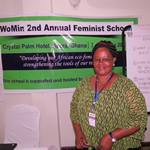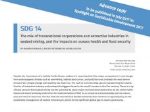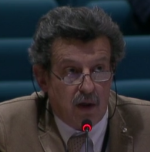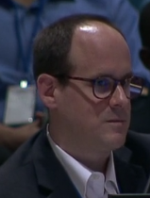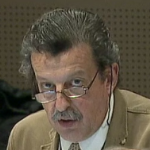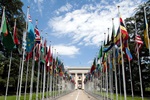Social Watch news
Published on Fri, 2017-07-07 12:03
Invitation to Side Event at the HLPF 2017 SDG 1 and Inequality organized by the Government of Togo, Global Call to Action Against Poverty (GCAP), Social Watch, International Forum of NGO Platforms (IFP), ATD Fourth World, Action for Sustainable Development, African Platform for Social Protection, Asia Civil Society Partnership on Sustainable Development (APSD) and CIVICUS World Alliance for Citizen Participation. |
Published on Thu, 2017-06-15 22:50
"What we have to ask ourselves is this: is Africa in control of our resources or is Africa entangled in this global system of accumulation which was brought by colonialism? How do we escape that bondage?" summarized Mela Chiponda, a participant at the Second annual WoMin Feminist School, hosted by Netright Ghana. "We didn't have title deeds, the land was not demarcated, nobody knew the acreage of their farms. So when we learned about this, the government came in and started to demarcate. and there was pause in the mining activities. But we are worried. It feels like a lion we have chased off, and it's lying in the grass waiting" said Sarah Makau, from Kenya. |
Published on Fri, 2017-06-09 15:36
Increasing oil and gas production while at the same time trying to reduce carbon emissions are conflicting priorities, argues a joint study by the University of Victoria, the Canadian Centre for Policy Alternatives and the Parkland Institute. The Climate Leadership Plan of the province of Alberta allows to expanding oil sands production by 53 per cent and emissions by 47 per cent above 2014 levels. To compensate and still meet Canada’s Paris Agreement commitments the rest of the Canadian economy should reduce emissions by 47 per cent by 2030. This will be virtually impossible in the time remaining barring an economic collapse. Three new pipelines have been approved in Canada and a fourth (Energy East) is under review even though oil supply forecasts show that not all are needed. This shows, according to the study that "Canada has no energy strategy beyond liquidating its remaining non-renewable resources as fast as possible to serve the economic interests of governments of the day. What we really need is a comprehensive energy strategy that addresses both the future energy security of Canadians and Canada’s commitments on climate change". |
Published on Thu, 2017-06-08 17:08
"Despite the importance of a healthy Pacific Ocean, evidence is mounting that this unique ecosystem is in real danger from anthropogenic threats such as overfishing, habitat destruction, and pollution and probably the most severe threat of all, climate change and resulting sea level rise" argued Maureen Penjueli, from the Pacific Network on Globalization, on occasion of the Ocean Conference that took place from June 5 to 9 at the United Nations in New York. The rush to mine the deep seas is representing the newest frontier of extractive industry and perhaps the biggest threat to the world’s oceans in the 21st century. There is a significant concern that seabed mining has the potential to cause major environmental destruction to the entire Pacific Ocean and would seriously undermine the implementation of SDG 14, to conserve and sustainably use the oceans, seas and marine resources. |
Published on Fri, 2017-06-02 22:29
The follow-up report of Government´s achievements in implementing the Agenda 2030 was published last weekend at World Village Festival in Helsinki. The report was prepared by ten Finnish organisations (The Finnish League for Human Rights, Kepa, Save the Children Finland, Plan International Finland, The Finnish Blue Ribbon, SOSTE Finnish Federation for Social Affairs and Health, The Finnish Association for Nature Conservation, Finnish Olympic Committee, Finnish Red Cross and WWF Finland), with each being responsible for its respective area of expertise. Other organisations have also contributed to the report. Representatives of the CSOs handed over the reports to the Minister of Foreign Trade and Development Kai Mykkänen and Minister for Housing, Energy and Environment Kimmo Tiilikainen. After the ceremony a lively panel discussion together with representatives of different parliamentary parties was held. The amount of ODA -funding started a vivid debate. The cuts made from CSO funding were seen especially problematic. Minister Mykkänen made a promise to increase the ODA-funding after the huge cuts the current Government made at the beginning of its term of office. |
Published on Thu, 2017-06-01 00:00
The Social Degradation Report explores the impact of the armed conflict in Syria on social relations. It uses the concept of social capital as an approach to analyse trust, cooperation, and shared values. Direct violence –including displacement, involvement in violent acts, and discriminatory institutional practices– affects both bridging and linking social capitals. Development indicators such as health, education, and employment are strongly correlated with the shared values and attitudes component. While these indicators are not directly related to violence, they affect the cognitive aspect of a shared vision for the community and the country, and are important factors in building the future social contract. Moreover, the research shows that conflict economy and conflict-related deaths are the main determinants of feeling secured, while the trust between individuals is affected by conflict economy, discriminatory institutions, forced displacement, and loss of job opportunities. The Syrian Centre for Policy Research (SCPR) launched its report “Social Degradation in Syria” in cooperation with the Issam Fares Institute for Public Policy and International Affairs (IFI) at the American University of Beirut (AUB) on June 1st. |
Published on Fri, 2017-05-26 16:06
We fear that financial markets are as unregulated now as they were in 2008, with PPP appearing as the only available financial mechanism when at the end in 30 years governments would end up paying said Roberto Bissio of Social Watch, who spoke at the event. The event “Domestic and international private business and finance” that was held last May 24th, 2017. The event took place in the framework of the second ECOSOC Forum on Financing for Development follow-up convened by the President of ECOSOC from 22 to 25 May 2017 at the United Nations Headquarters in New York. |
Published on Fri, 2017-05-26 15:48
Building capacity on tax matters is not just an issue for the global South, governments in the North should also strenghtend their own tax capacity, their own administration capacities when it cames to tax matters said Wolfgang Obenland, member of Global Policy Forum (GPF), Germany, who spoke at the event. The event Follow-up and review of the financing for development outcomes and the means of implementation of the 2030 Agenda for Sustainable Development that was held last May 24th, 2017. The event took place in the framework of the second ECOSOC Forum on Financing for Development follow-up convened by the President of ECOSOC from 22 to 25 May 2017 at the United Nations Headquarters in New York. |
Published on Fri, 2017-05-26 15:23
Social security is a human right and in time of crisis is even more important, not just to face the crisis and the impact on people but also to estabilize the economy said Roberto Bissio, Coordinator of Social Watch, who was a speaker on behalf of the Global Coalition for Social Protection Floors (GCSPF) at the side event "Financing Social Protection Floors throught economic cycles". |
Published on Fri, 2017-05-26 13:52
The question pertaining to the impact of States’ participation in designing an Instrument on transnational corporations and other business enterprises in the area of human rights (hereafter referred to as ‘the Instrument’) on attracting foreign direct investment has been a persistent issue of discussion since the mandate of the intergovernmental group on the Instrument was established. This mandate was established by Resolution A/ HRC/26/9 of the United Nations Human Rights Council, which was passed in July 2014. It is important to contextualize this question within an understanding of the role of investment policy as one of the development and economic policy tools available to States, including the role of both domestic and foreign investments, and within an understanding of the underlying determinants of foreign direct investment. This discussion could be informed by the experience of countries reforming their positions towards investment treaties, which entail a regulatory change pertaining to foreign investors. |
SUSCRIBE TO OUR NEWSLETTER


